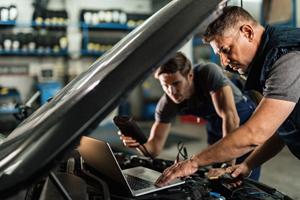The importance of tire maintenance

Tires are something a lot of drivers take for granted. However, ignoring your tires can come at a cost – worn out tires can reduce the control you have of your vehicle, decrease gas mileage and result in a less comfortable ride. So, when the rubber hits the road, you’ll want to make sure your tires are in optimal shape. The good news is, with a little diligence, you can play a big part in keeping your tires roadworthy.
Get pumped
The most important thing to consider is inflation. Seems obvious, but consider that, according to the National Highway Traffic Safety Association, just 19% of drivers keep their tires properly inflated. Plus, properly inflated tires can save drivers up to 11 cents per gallon on fuel.
Simply put: properly inflated tires perform better, last longer and keep you safer. All you need is a tire pressure gauge, which can be purchased at most auto parts stores. Use it every 3,000 miles or right before a long trip, especially during cold weather when tires naturally deflate. And if you have a newer car, your dashboard may indicate when your tire pressure is getting low. Don’t ignore it.
You can always refer to the owner’s manual to determine what the correct inflation is for your tires. Tire pressure limits can be found on a printed sticker inside the driver's door. Note: don’t use the “maximum limit” included on the tire as your guide. That number reflects the maximum amount of pressure the tire can safely take. Overinflating tires can result in reduced traction and the increased possibility of a blowout.
'Change' your tires
An important element to check every 3,000 miles is your tire’s tread depth. A tire depth gauge is the most efficient way to measure tread depth, but there’s an easy way to do it as well with a little spare change you may have around the house.
Stay in the rotation
Lastly, seeing how much rotating they already do, it may sound like odd advice to rotate your tires. But, tires do not wear out uniformly, which means they gradually become unbalanced. This contributes to your car “leaning” when you let go of a wheel, a shimmy in the steering wheel at certain speeds, and decreased tire life as well. Have your mechanic rotate front-to-back (and vice versa) every 6,000 miles or so.
Good tires are worth the care. If you get into an accident, having mechanical parts replacement auto coverage, like the kind offered by The Hanover, means you’ll receive the full amount for new tires in the event of a claim, without a deduction for depreciation. Talk to your independent insurance agent to make sure your tires – and your car – are properly protected.
Sources:
Family Handyman
Related resources
The importance of tire maintenance
Tires are something a lot of drivers take for granted. However, ignoring your tires can come at a cost – worn out tires can reduce the control you have of your vehicle, decrease gas mileage and result in a less comfortable ride. So, when the rubber hits the road, you’ll want to make sure your tires are in optimal shape. The good news is, with a little diligence, you can play a big part in keeping your tires roadworthy.
Get pumped
The most important thing to consider is inflation. Seems obvious, but consider that, according to the National Highway Traffic Safety Association, just 19% of drivers keep their tires properly inflated. Plus, properly inflated tires can save drivers up to 11 cents per gallon on fuel.
Simply put: properly inflated tires perform better, last longer and keep you safer. All you need is a tire pressure gauge, which can be purchased at most auto parts stores. Use it every 3,000 miles or right before a long trip, especially during cold weather when tires naturally deflate. And if you have a newer car, your dashboard may indicate when your tire pressure is getting low. Don’t ignore it.
You can always refer to the owner’s manual to determine what the correct inflation is for your tires. Tire pressure limits can be found on a printed sticker inside the driver's door. Note: don’t use the “maximum limit” included on the tire as your guide. That number reflects the maximum amount of pressure the tire can safely take. Overinflating tires can result in reduced traction and the increased possibility of a blowout.
'Change' your tires
An important element to check every 3,000 miles is your tire’s tread depth. A tire depth gauge is the most efficient way to measure tread depth, but there’s an easy way to do it as well with a little spare change you may have around the house.
Stay in the rotation
Lastly, seeing how much rotating they already do, it may sound like odd advice to rotate your tires. But, tires do not wear out uniformly, which means they gradually become unbalanced. This contributes to your car “leaning” when you let go of a wheel, a shimmy in the steering wheel at certain speeds, and decreased tire life as well. Have your mechanic rotate front-to-back (and vice versa) every 6,000 miles or so.
Good tires are worth the care. If you get into an accident, having mechanical parts replacement auto coverage, like the kind offered by The Hanover, means you’ll receive the full amount for new tires in the event of a claim, without a deduction for depreciation. Talk to your independent insurance agent to make sure your tires – and your car – are properly protected.
Sources:
Family Handyman
Related resources
The importance of tire maintenance
Tires are something a lot of drivers take for granted. However, ignoring your tires can come at a cost – worn out tires can reduce the control you have of your vehicle, decrease gas mileage and result in a less comfortable ride. So, when the rubber hits the road, you’ll want to make sure your tires are in optimal shape. The good news is, with a little diligence, you can play a big part in keeping your tires roadworthy.
Get pumped
The most important thing to consider is inflation. Seems obvious, but consider that, according to the National Highway Traffic Safety Association, just 19% of drivers keep their tires properly inflated. Plus, properly inflated tires can save drivers up to 11 cents per gallon on fuel.
Simply put: properly inflated tires perform better, last longer and keep you safer. All you need is a tire pressure gauge, which can be purchased at most auto parts stores. Use it every 3,000 miles or right before a long trip, especially during cold weather when tires naturally deflate. And if you have a newer car, your dashboard may indicate when your tire pressure is getting low. Don’t ignore it.
You can always refer to the owner’s manual to determine what the correct inflation is for your tires. Tire pressure limits can be found on a printed sticker inside the driver's door. Note: don’t use the “maximum limit” included on the tire as your guide. That number reflects the maximum amount of pressure the tire can safely take. Overinflating tires can result in reduced traction and the increased possibility of a blowout.
'Change' your tires
An important element to check every 3,000 miles is your tire’s tread depth. A tire depth gauge is the most efficient way to measure tread depth, but there’s an easy way to do it as well with a little spare change you may have around the house.
Stay in the rotation
Lastly, seeing how much rotating they already do, it may sound like odd advice to rotate your tires. But, tires do not wear out uniformly, which means they gradually become unbalanced. This contributes to your car “leaning” when you let go of a wheel, a shimmy in the steering wheel at certain speeds, and decreased tire life as well. Have your mechanic rotate front-to-back (and vice versa) every 6,000 miles or so.
Good tires are worth the care. If you get into an accident, having mechanical parts replacement auto coverage, like the kind offered by The Hanover, means you’ll receive the full amount for new tires in the event of a claim, without a deduction for depreciation. Talk to your independent insurance agent to make sure your tires – and your car – are properly protected.
Sources:
Family Handyman
Related resources
The importance of tire maintenance
Tires are something a lot of drivers take for granted. However, ignoring your tires can come at a cost – worn out tires can reduce the control you have of your vehicle, decrease gas mileage and result in a less comfortable ride. So, when the rubber hits the road, you’ll want to make sure your tires are in optimal shape. The good news is, with a little diligence, you can play a big part in keeping your tires roadworthy.
Get pumped
The most important thing to consider is inflation. Seems obvious, but consider that, according to the National Highway Traffic Safety Association, just 19% of drivers keep their tires properly inflated. Plus, properly inflated tires can save drivers up to 11 cents per gallon on fuel.
Simply put: properly inflated tires perform better, last longer and keep you safer. All you need is a tire pressure gauge, which can be purchased at most auto parts stores. Use it every 3,000 miles or right before a long trip, especially during cold weather when tires naturally deflate. And if you have a newer car, your dashboard may indicate when your tire pressure is getting low. Don’t ignore it.
You can always refer to the owner’s manual to determine what the correct inflation is for your tires. Tire pressure limits can be found on a printed sticker inside the driver's door. Note: don’t use the “maximum limit” included on the tire as your guide. That number reflects the maximum amount of pressure the tire can safely take. Overinflating tires can result in reduced traction and the increased possibility of a blowout.
'Change' your tires
An important element to check every 3,000 miles is your tire’s tread depth. A tire depth gauge is the most efficient way to measure tread depth, but there’s an easy way to do it as well with a little spare change you may have around the house.
Stay in the rotation
Lastly, seeing how much rotating they already do, it may sound like odd advice to rotate your tires. But, tires do not wear out uniformly, which means they gradually become unbalanced. This contributes to your car “leaning” when you let go of a wheel, a shimmy in the steering wheel at certain speeds, and decreased tire life as well. Have your mechanic rotate front-to-back (and vice versa) every 6,000 miles or so.
Good tires are worth the care. If you get into an accident, having mechanical parts replacement auto coverage, like the kind offered by The Hanover, means you’ll receive the full amount for new tires in the event of a claim, without a deduction for depreciation. Talk to your independent insurance agent to make sure your tires – and your car – are properly protected.
Sources:
Family Handyman





